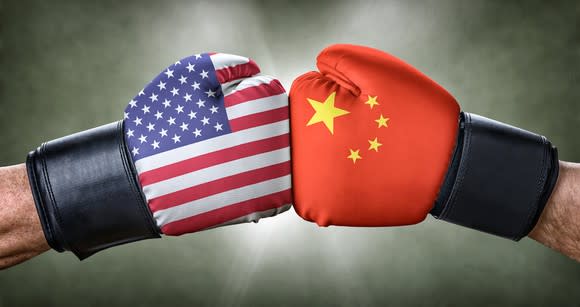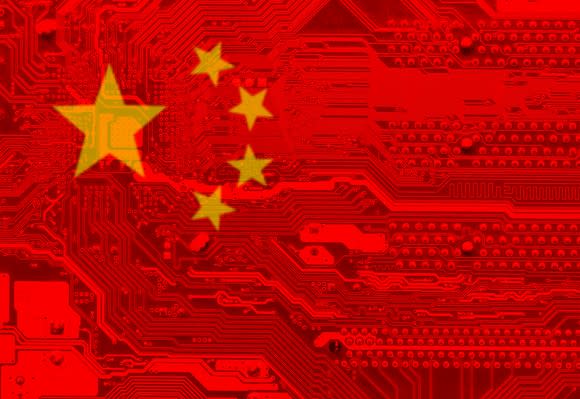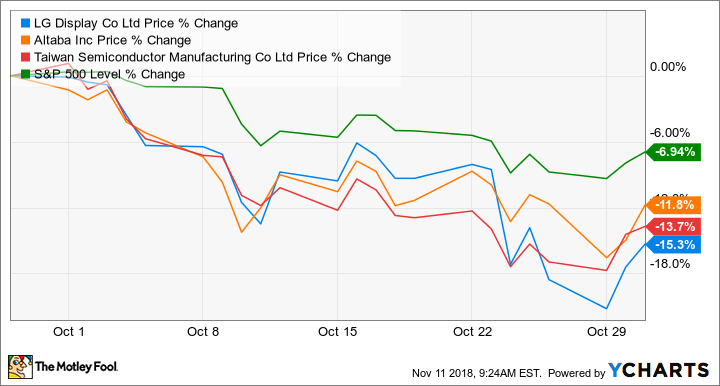Trade Tensions Hurt These Tech Stocks Last Month
Trade tension between Washington and Beijing pumped the brakes on many stocks in the technology sector last month. According to data from S&P Global Market Intelligence, shares of digital display maker LG Display (NYSE: LPL) lost 15.3% of their value last month. At the same time, semiconductor manufacturing giant Taiwan Semiconductor Manufacturing (NYSE: TSM) suffered a 13.7% loss and Altaba (NASDAQ: AABA) -- the remnants of good old Yahoo!, now operating as a focused investment fund built around Yahoo!'s early investment in e-commerce titan Alibaba Group (NYSE: BABA) -- got an 11.8% haircut. Alibaba itself saw a 13.6% drop.
All of these drops were directly linked to the Chinese-American trade wars, and I picked them out of a very large pool of October drops to illustrate how the same economic trend reached into many different corners of the market. And sometimes, the perception of a tariff-based threat can be more important than the actual effects of those government actions.

Image source: Getty Images.
So what
These three companies do a lot of business in the Middle Kingdom. LG Display and Taiwan Semi ship most of their finished products to the giant manufacturing hubs of China, where they become part of a smartphone, a piece of industrial machinery, the logic boards at the heart of modern cars, and so on. For example, 61% of LG Display's second-quarter orders came from Chinese customers. And Altaba's fortunes are tied directly to the success of Alibaba, which collected 92% of its total revenue from Chinese e-commerce and cloud computing operations in the third quarter.
So the links from my chosen companies to the Chinese economy are clear, and their investors are right to worry about potential impacts from the high-level political tension between the U.S. and China. That's exactly what we saw in October. The second wave of trade tariffs on Chinese goods took effect near the end of September and the tension between President Trump and his Chinese counterpart, Xi Jinping, just kept climbing. Every time tariff talks made the news, the stock market as a whole took a small hit. The tickers in this overview consistently suffered larger drops than the average stock, thanks to their important business opportunities in China.
In some cases, the tariff threat is real.
Alibaba will let its inventories build up while the trade conflict lasts, rather than forcing its merchants to liquidate surplus goods with deep-discount rebates. The company's highest priority is to support healthy trade within China, even if it means leaving some profits on the table in the short term. Alibaba will lighten the inventory load and get back to chasing international growth when the trade intermezzo is over. Altaba simply follows suit.
In others, the effects are less obvious.
LG Display does worry about trade tariffs, but display panel prices rise and fall because of many unrelated issues. Different types of displays move for different reasons, and management expects the prices in its product portfolio to diverge over time. The company responds to changing market conditions by adjusting its production mix. With or without trade tensions, LG Display's most important move at the moment is converting its manufacturing facilities for LCD screens to support newer and more profitable OLED technologies. Here, the trade wars might slow down the conversion project a bit.

Image source: Getty Images.
And finally, the trade wars might not really matter at all -- but investors think that they do.
The preceding chart shows Taiwan Semi suffering the same trade war pains as Altaba and LG Display, but this company's management insists that the border-crossing tensions really don't matter at all.
"For the short term, we did not see any impact, if there's any at all. So our China customers, no, they did not change their behavior," Wei said according to a Seeking Alpha transcript. "TSMC has been proud to be the everybody's foundry. So if there's a trade tension, if there is, and if it continues, I think that TSMC -- the impact to TSMC would be less or minimized because if -- we still need the semiconductor device, and TSMC is everybody's foundry, right, so whether they produce here, produce there, it's all TSMC's customer."
In other words, the chip sector depends too much on Taiwan Semi's services to take their business elsewhere in any meaningful volume.
Now what
The trade wars cannot last forever, and Washington has already started signaling an end to the whole mess. It's unclear exactly how much longer we'll have to wait, or exactly how sharp and sudden the turnaround might be when it comes, but investors can start planning ahead. In particular, nibbling at tariff-proof companies like TSMC while their stocks are trading down for poorly supported reasons should result in solid gains when the international tension ends.
More From The Motley Fool
Anders Bylund owns shares of Alibaba Group. The Motley Fool recommends Altaba. The Motley Fool has a disclosure policy.

 Yahoo Finance
Yahoo Finance 
